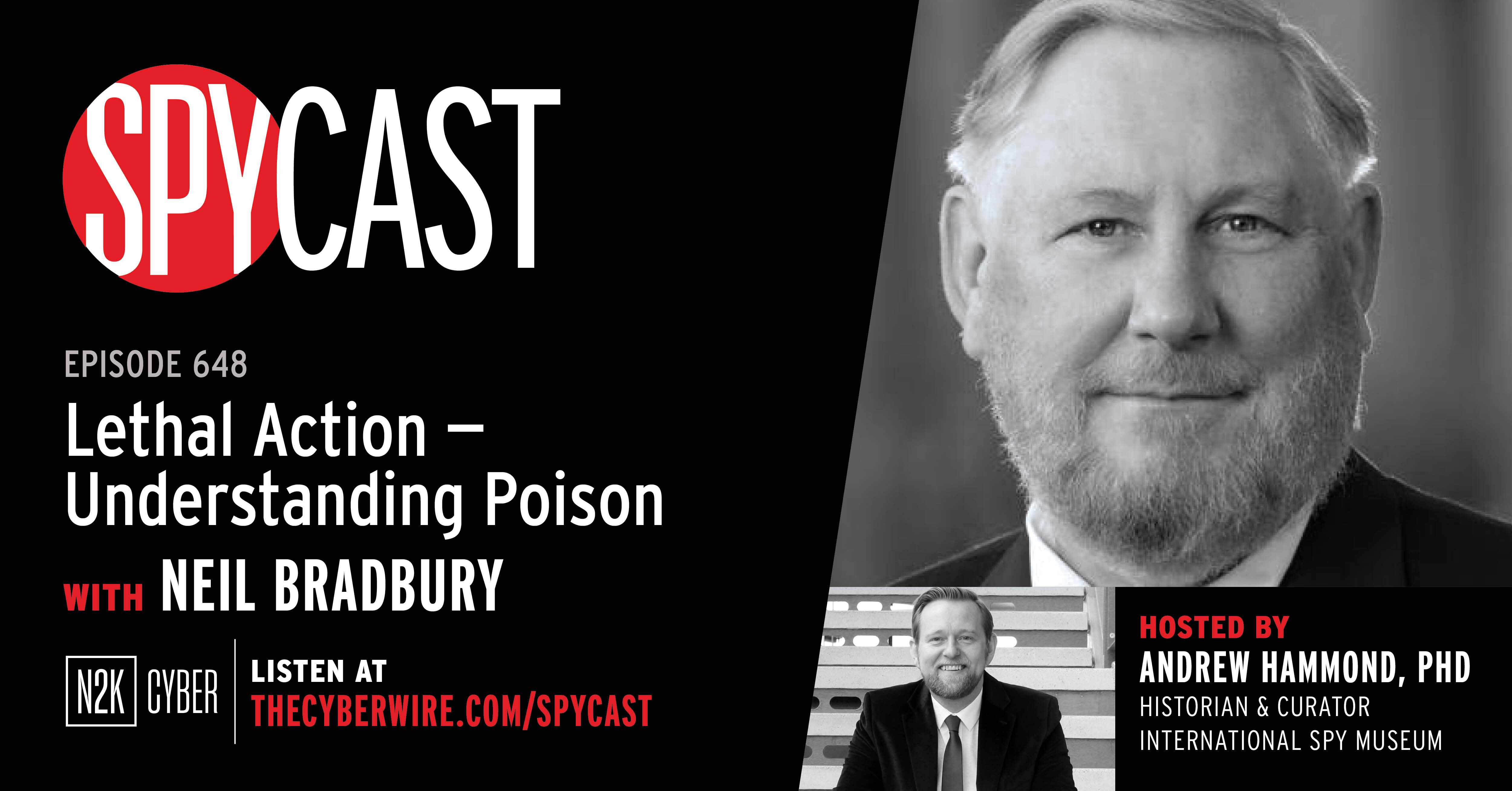
Lethal Action - Understanding Poison with Neil Bradbury
Summary
Neil Bradbury (Website, LinkedIn) joins Andrew (X; LinkedIn) to discuss the deadly history of poison and espionage. Neil is an author and biochemist.
What You’ll Learn
Intelligence
- How different poisons affect the human body
- The usage of poisons as a covert assassination method
- The deaths of defectors Alexander Litvinenko and Georgi Markov
- The Soviet Union’s Lab X and the production and research of poisons on the state level
Reflections
- The double edge of creativity
- The necessity for research and experimentation
And much, much more …
Episode Notes
This week, Andrew was joined in the studio by Dr. Neil Bradbury, author of the book A Taste for Poison: Eleven Deadly Substances and the Killers who Used Them. Neil is an author, a researcher, and a professor of physiology and biophysics at the Rosalind Franklin University of Medicine and Science. In this episode, Neil and Andrew discuss some of the most famous cases of poison within espionage, and explore how exactly these deadly devices affect the human body. We really can’t think of a better person to give us a lesson on this fascinating, and quite scary, method of lethal action!
And…
Perhaps the only people who have a greater “Taste for Poison” than spies are authors – Readers of Shakespeare will recall Juliet’s tragic demise at the hands of a potion, thought to be deadly nightshade, or the witches’ brew in Macbeth that included root of hemlock. Agatha Christie fans in particular will recall a number of murders at the hand of poison in her many novels – Test your literary poison knowledge here.
Quotes of the Week
“In order to counteract lots of the poisons, you have to know how they work, and you have to be able to develop your own. So, yes, undoubtedly, Western governments are just as actively involved in creating these chemicals and also the antidotes to them.” – Dr. Neil Bradbury.
Resources
SURFACE SKIM
*Spotlight Resource*
- A Taste for Poison: Eleven Deadly Molecules and the Killers Who Used Them, Neil Bradbury (St. Martin’s Press, 2022)
*SpyCasts*
- The Murder of an IRA Spy with Henry Hemming (2024)
- I Helped Solve the Final Zodiac Killer Cipher with David Oranchak (2024)
- The North Korean Defector with Former DPRK Agent Kim, Hyun Woo (2023)
- Spies: The Epic Intelligence War Between East vs. West with Calder Walton (2023)
*Beginner Resources*
- What is a poison? Royal Society of Chemistry (2015) [Article]
- The Deadliest Toxins on Earth, SciShow, YouTube (2013) [10 min. video]
- A short history of deadly potions and poisons, J. Stephens, National University of Ireland Maynooth (n.d.) [Short article]
DEEPER DIVE
Books
- Poison: The History of Potions, Powders and Murderous Practitioners, B. Hubbard (Welbeck Publishing, 2020)
- Poison: A History: An Account of the Deadly Art and its Most Infamous Practitioners, J. Davis (Chartwell Books, 2018)
- The KGB's Poison Factory: From Lenin to Litvinenko, B. Volodarsky (Zenith Press, 2010)
Articles
- Murder on Waterloo Bridge: placing the assassination of Georgi Markov in past and present context, 1970 – 2018, D. Salisbury & K. Dewey, Contemporary British History (2023)
- The history of poisoning: from ancient times until modern era, E. Nepovimova & K. Kuca, National Library of Medicine (2018)
- Russian spy poisoning: What we know so far, BBC News (2018)
- A Brief History of Attempted Russian Assassinations by Poison, E. Groll, Foreign Policy (2018)
- Deadly Spy Games: The Poisoning of Alexander Litvinenko, K. Lerner, Harvard Blogs (2006)
- Report on 640 Victims of the Tokyo Subway Sarin Attack, T. Okumura et. al, Annals of Emergency Medicine (1996)
Video
- Litvinenko: The Mayfair Poisoning, BBC Select (2024)
- The Umbrella Assassin, PBS (2006)
Primary Sources
- Press Release on the Poisoning of Alexei Navalny (2020)
- Update on the Use of Nerve Agent in Salisbury, UK (2018)
- The Litvinenko Inquiry (2016)
- Situation Report on Piesteritz (1953)
- Analysis of Madame Lefarge’s Arsenic Trial (1840)
*Wildcard Resource*
- This week’s companion song can only be Waterloo Sunset (1967) by The Kinks.
- Heralded as one of the most beautiful songs of the swingin’ sixties, “Waterloo Sunset” is appropriately incorporated into the title of Neil’s chapter on the assassination of Georgi Markov, which took place on London’s Waterloo Bridge.


